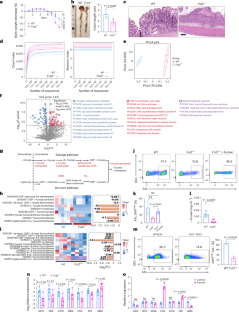Bacterial and host fucosylation maintain IgA homeostasis to limit intestinal inflammation in mice
IF 19.4
1区 生物学
Q1 MICROBIOLOGY
引用次数: 0
Abstract
Inflammatory bowel disease is associated with several genetic risk loci. Loss-of-function mutation in the α1,2-fucosyltransferase (fut2) gene, which alters fucosylation on the surface of intestinal epithelial cells, is one example. However, whether bacterial fucosylation can contribute to gut inflammation is unclear. Here we show that host fucosylation status influences fucosylation biosynthesis by gut commensal bacteria. Mice colonized with faecal microbiota of Fut2 knockout mice or Bacteroides fragilis with lower surface fucosylation are predisposed to colitis. This was supported by human cohort data showing that bacterial fucosylation levels decrease in patients with inflammatory bowel disease and correlate with intestinal inflammation. Using a mouse model for Bacteroides fragilis to explore the role of fucosylation in gut immunity, we show that the fucosylation status of epithelial cells and bacteria is critical for maintaining B cell responses in the gut. Host-derived and dietary fucose mediate immunoglobulin A (IgA) recognition of gut microbiota, and this interaction facilitates the translocation of commensals to Peyer’s patches and alters the immune landscape of Peyer’s patches with increased germinal centre B cells and IgA-secreting antigen-specific B cells. Finally, dietary fucose enhances the IgA response against Salmonella and protects against systemic bacterial dissemination. This highlights the role of host and bacterial fucosylation in maintaining IgA homeostasis and immune escape mechanisms. Bacterial and host fucosylation protect against colitis by maintaining the IgA B cell response in the mouse gut.


细菌和宿主岩藻糖基化维持 IgA 平衡,限制小鼠肠道炎症
炎症性肠病与几个遗传风险基因位点有关。例如,α1,2-岩藻糖基转移酶(fut2)基因的功能缺失突变会改变肠上皮细胞表面的岩藻糖基化。然而,细菌的岩藻糖基化是否会导致肠道炎症还不清楚。在这里,我们发现宿主的岩藻糖基化状态会影响肠道共生细菌的岩藻糖基化生物合成。小鼠定植于表面岩藻糖基化较低的 Fut2 基因敲除小鼠或脆弱拟杆菌的粪便微生物群后,易患结肠炎。人类队列数据也证明了这一点,这些数据显示,炎症性肠病患者体内的细菌岩藻糖基化水平降低,并与肠道炎症相关。我们利用脆弱拟杆菌小鼠模型来探索岩藻糖基化在肠道免疫中的作用,结果表明上皮细胞和细菌的岩藻糖基化状态对于维持肠道中的 B 细胞反应至关重要。宿主来源的岩藻糖和膳食岩藻糖介导了肠道微生物群的免疫球蛋白 A(IgA)识别,这种相互作用促进了共生菌向佩耶氏斑块的转移,并改变了佩耶氏斑块的免疫格局,增加了生殖中心 B 细胞和分泌 IgA 的抗原特异性 B 细胞。最后,膳食岩藻糖可增强针对沙门氏菌的 IgA 反应,并防止细菌全身扩散。这凸显了宿主和细菌岩藻糖基化在维持 IgA 平衡和免疫逃逸机制中的作用。
本文章由计算机程序翻译,如有差异,请以英文原文为准。
求助全文
约1分钟内获得全文
求助全文
来源期刊

Nature Microbiology
Immunology and Microbiology-Microbiology
CiteScore
44.40
自引率
1.10%
发文量
226
期刊介绍:
Nature Microbiology aims to cover a comprehensive range of topics related to microorganisms. This includes:
Evolution: The journal is interested in exploring the evolutionary aspects of microorganisms. This may include research on their genetic diversity, adaptation, and speciation over time.
Physiology and cell biology: Nature Microbiology seeks to understand the functions and characteristics of microorganisms at the cellular and physiological levels. This may involve studying their metabolism, growth patterns, and cellular processes.
Interactions: The journal focuses on the interactions microorganisms have with each other, as well as their interactions with hosts or the environment. This encompasses investigations into microbial communities, symbiotic relationships, and microbial responses to different environments.
Societal significance: Nature Microbiology recognizes the societal impact of microorganisms and welcomes studies that explore their practical applications. This may include research on microbial diseases, biotechnology, or environmental remediation.
In summary, Nature Microbiology is interested in research related to the evolution, physiology and cell biology of microorganisms, their interactions, and their societal relevance.
 求助内容:
求助内容: 应助结果提醒方式:
应助结果提醒方式:


